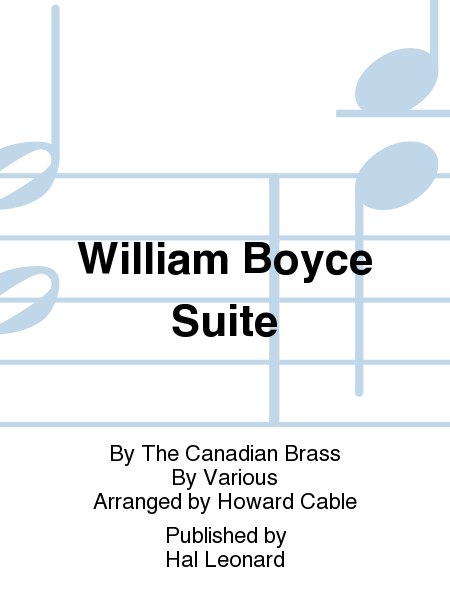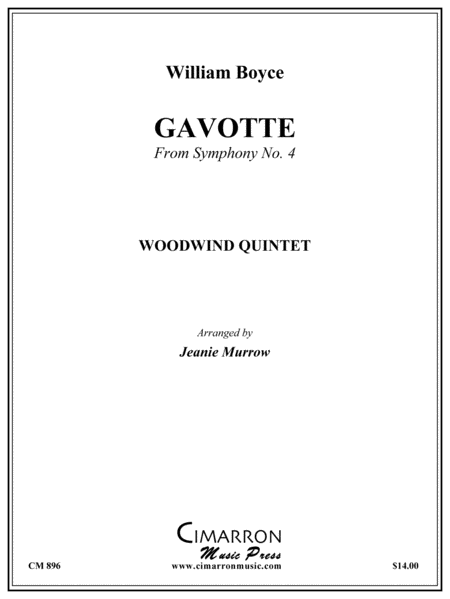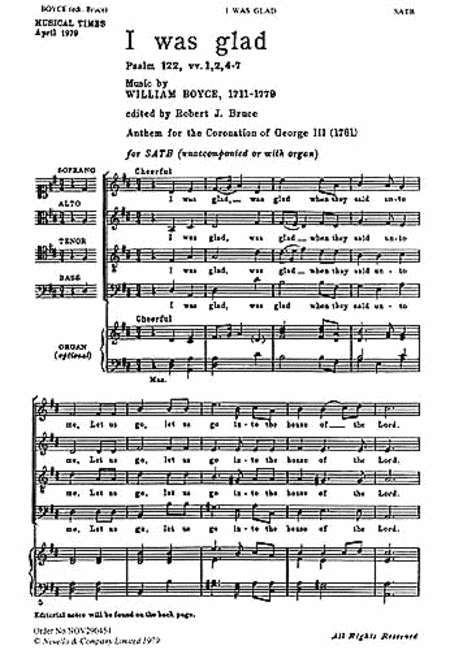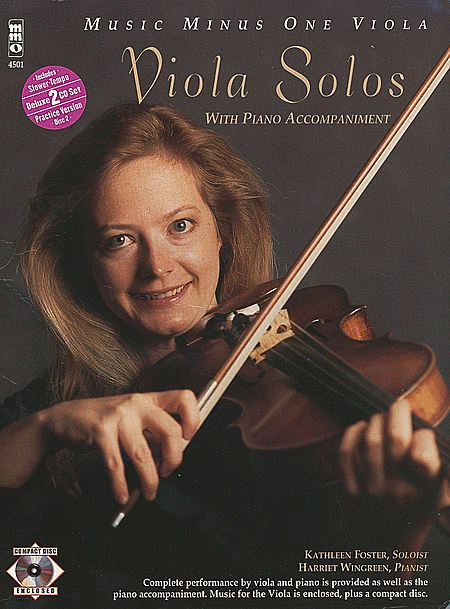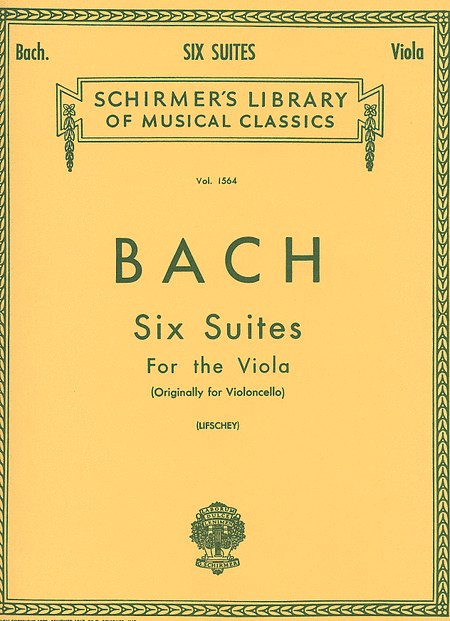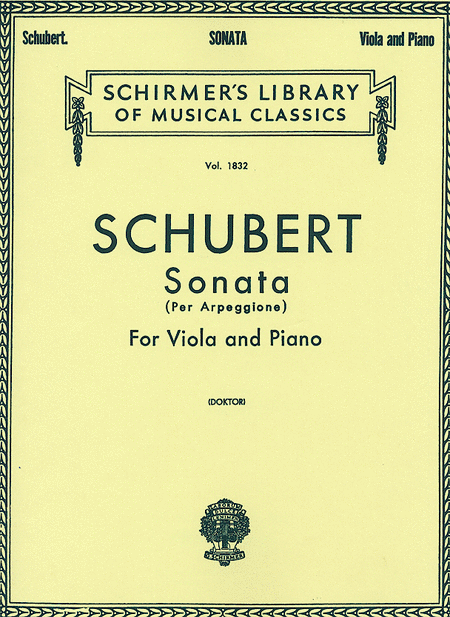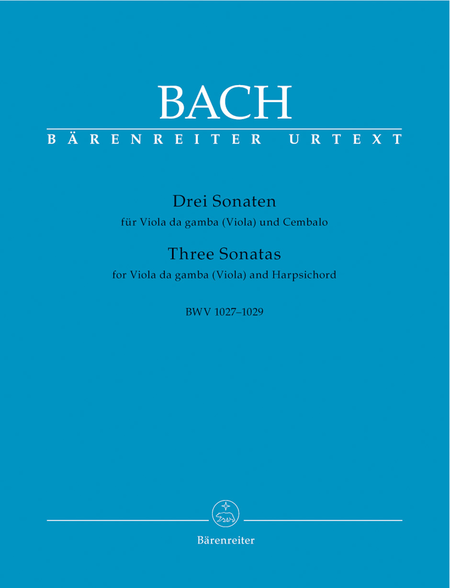William Boyce (1711 – 1779) was an English composer
and organist. He was born in London, at Joiners Hall,
then in Lower Thames Street, to John Boyce, at the time
a joiner and cabinet-maker, and beadle of the
Worshipful Company of Joiners and Ceilers, and his wife
Elizabeth Cordwell. He was baptised on 11 September
1711 and was admitted by his father as a choirboy at St
Paul's Cathedral in 1719. After his voice broke in
1727, he studied music with Maurice Greene.
His first professional...(+)
William Boyce (1711 – 1779) was an English composer
and organist. He was born in London, at Joiners Hall,
then in Lower Thames Street, to John Boyce, at the time
a joiner and cabinet-maker, and beadle of the
Worshipful Company of Joiners and Ceilers, and his wife
Elizabeth Cordwell. He was baptised on 11 September
1711 and was admitted by his father as a choirboy at St
Paul's Cathedral in 1719. After his voice broke in
1727, he studied music with Maurice Greene.
His first professional appointment came in 1734 when he
was employed as an organist at the Oxford Chapel in
central London. He went on to take a number of similar
posts before being appointed Master of the King's
Musick in 1757 (he had applied for the post on the
death of Maurice Greene in 1755) and becoming one of
the organists at the Chapel Royal in 1758. He also gave
lessons, his daughter telling the composer R. J. S.
Stevens that both Thomas Linley the Elder and Thomas
Linley the Younger had been his pupils in counterpoint
in the period 1763-1768.
His work as a composer began in the 1730s, writing
songs for Vauxhall Gardens. In 1736 he was named as
composer to the Chapel Royal and wrote the oratorio
David's Lamentation over Saul and Jonathan. He was
engaged as conductor to the Three Choirs Festival in
1737; many of his works, including the Worcester
Overture (today known as his Symphony no. 8), will have
been premiered at the Festival over the succeeding
years. The 1740s saw his opera Peleus and Thetis, the
serenata Solomon, and his Secular Masque, to a libretto
by John Dryden. In 1749 he wrote an ode and the anthem
O be joyful to celebrate the installation of the Duke
of Newcastle as Chancellor of Cambridge University, and
was awarded the degree of Doctor of Music. In 1747 he
had published his first purely instrumental
composition, a set of "Twelve Sontas for Two Violins
and a Bass" and these proved popular. Charles Burney
wrote that they were "not only in constant use, as
Chamber music, in private concerts ... but in our
theatres, as act-tunes [i.e. intermezzi] and public
gardens, as favourite pieces, during many years."
In the 1750s Boyce supplied David Garrick with songs
and other music for many productions at the Drury Lane
Theatre. These included his own operas The Chaplet and
The Shepherd's Lottery, both to libretti by Moses
Mendez, and for Garrick's 1759 pantomime Harlequin's
Invasion which contained what became Boyce's most
famous song, Heart of Oak.
As Master of the King's Musick Boyce had the
responsibility of writing music for royal occasions
including funerals, weddings and coronations. He,
however, refused to make a new setting of Zadok the
Priest for the coronation of George III in 1761 on the
grounds that Handel's setting of the anthem was
unsurpassable – as a consequence of which Handel's
setting has been played at every subsequent British
coronation.
By the year 1758, his deafness had increased to such an
extent that he was unable to continue in his organist
posts. He resolved to give up teaching and to retire to
Kensington, and devote himself to editing the
collection of church music which bears his name. He
retired and worked on completing the compilation
Cathedral Music that his teacher Greene had left
incomplete at his death. This led to Boyce editing
works by the likes of William Byrd and Henry Purcell.
Many of the pieces in the collection are still used in
Anglican services today.
"Heart of Oak" is the official march of the Royal Navy.
It is also the official march of several Commonwealth
navies, including the Royal Canadian Navy and the Royal
New Zealand Navy. It was also the official march of the
Royal Australian Navy, but has now been replaced by the
new march, "Royal Australian Navy".
The music of "Heart of Oak" was composed by William
Boyce, and the words were written by the 18th-century
English actor David Garrick. "Heart of Oak" was
originally written as part of an opera. It was first
played publicly on New Year's Eve of 1760, sung by
Samuel Thomas Champnes, one of Handel's soloists, as
part of Garrick's pantomime Harlequin's Invasion, at
the Theatre Royal, Drury Lane.
The "wonderful year" referenced in the first verse was
the Annus Mirabilis of 1759, during which British
forces were victorious in several significant battles:
the Battle of Minden on 1 August 1759; the Battle of
Lagos on 19 August 1759; the Battle of the Plains of
Abraham (outside Quebec City) on 13 September 1759; and
the Battle of Quiberon Bay on 20 November 1759. The
last battle foiled a French invasion project planned by
the Duc de Choiseul to defeat Britain during the Seven
Years' War, hence the reference in the song to
'flat-bottom' invasion barges. These victories were
followed a few months later by the Battle of Wandiwash
in India on 22 January 1760. Britain's continued
success in the war boosted the song's popularity.
The oak in the song's title refers to the wood from
which British warships were generally made during the
age of sail. The "Heart of oak" is the strongest
central wood of the tree. The phrase "hearts of oak"
appears in James Rhoades' 1921 English translation for
Oxford University Press of the Aeneid.
The reference to "freemen not slaves" echoes the
refrain ("Britons never will be slaves!") of Rule,
Britannia!, written and composed two decades earlier.
Source: Wikipedia
(https://en.wikipedia.org/wiki/William_Boyce_(composer)
).
Although originally written for Voice, Flute &
Continuo, I created this arrangement of "Heart of Oak"
(Liberty Song) for Viola & Piano.


